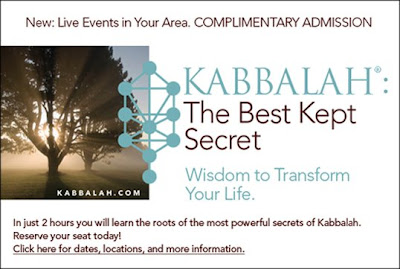.jpg)


 his month’s holiday of Passover is all about the commemoration of the Exodus from Egypt that took place thousands of years ago. Or is it a commemoration? Kabbalistically, it’s a connection….to the forces that can enable us to leave our forms of slavery, ie addiction, fears, neediness, etc.
his month’s holiday of Passover is all about the commemoration of the Exodus from Egypt that took place thousands of years ago. Or is it a commemoration? Kabbalistically, it’s a connection….to the forces that can enable us to leave our forms of slavery, ie addiction, fears, neediness, etc.One of the great secrets of fleeing that which binds us is to seek to be unified with the people around you. In describing the mass escape from the Egypt way back when, the Bible says, “All the souls of Jacob who came into Egypt were 70.”
When examining this statement in its original Aramaic, the singular form for souls (nefesh) is used, not the plural form (nefeshot). Why the improper grammar? The answer can be found in the kabbalistic concept which states, we are like grapes on the vine, separate but connected.
The secret to getting out of our heads is to look outwards and to focus on others and to see where we can be of assistance, even in the smallest of ways. The Kabbalists explain that when the house of Jacob first came to Egypt, they were “one soul,” which is the meaning of the choice of the singular form of the word nefesh. Yes, we may be physically separate and dealing with our own pains and joys, but on a soul level, we are all one.
This means that when another has pain, we have to feel it as if the pain were our own. If we hear that someone else has a dilemma, we need to help them as if it were our own dilemma. For inspiration we can look to Moses who, according to the Sages, would feel a person’s pain with his entire body like it were his own (and probably more so than the person actually in pain).
In Kabbalah, we often speak about this topic of feeling another’s pain. We hit this note so often because beneath the shallow veneer of our daily lives, there is a deep current of meaning and purpose that carries us towards something bigger than ourselves. The Kabbalists explain that prior to our Creation, all of the individual souls of the world existed in a state of oneness. At the point of impact that scientists refer to as The Big Bang, sparks of this soul were sent flying in infinite directions. Our mission now is to facilitate the re-gathering of these sparks, to return ourselves to this blissful state of oneness.
This is a mission that is accomplished in stages. When we experience being one soul with our fellow human, we demonstrate for ourselves and the world the one-ness of all humanity. We start with the one-ness of family and learn to extend it to the various group levels in which we find ourselves, finally extending it to the world and the universe.
Every day this month, as you confront yourself and your issues (and especially when you make your connections at Passover – check your local Kabbalah Centre for celebrations), remember first and foremost to connect to those around you. Doing so will not only reveal the Creator’s Light into your life, but into the neighborhoods and towns and cities and countries and continents of this planet…and beyond.
The 72 Names of God for Kids
Written by the "People's Kabbalist" Yehuda Berg with award-winning author Dev Ross, The 72 Names of God for Kids: A Treasury of Timeless Wisdom introduces young readers to Kabbalah teachings and combinations of Aramaic letters that spell God's names - not ordinary names like Joshua or Sarah, but rather mystical names that can help one quiet selfish impulses, open one's heart spiritually, and become a better person. The names embody positive qualities from stopping fighting to happiness to freedom, believing in ourselves, and much more. The color illustrations express emotion directly to young hearts, in this wonderful introduction to Kabbalah. Great for adults too!
Copy and paste the following link on your browser for dates and locations:
http://www.blogger.com/www.kabbalah.com/lks/register.html?cid=20090209d



